Magid Magid: 'I don't intend to try to fit in'
- Published
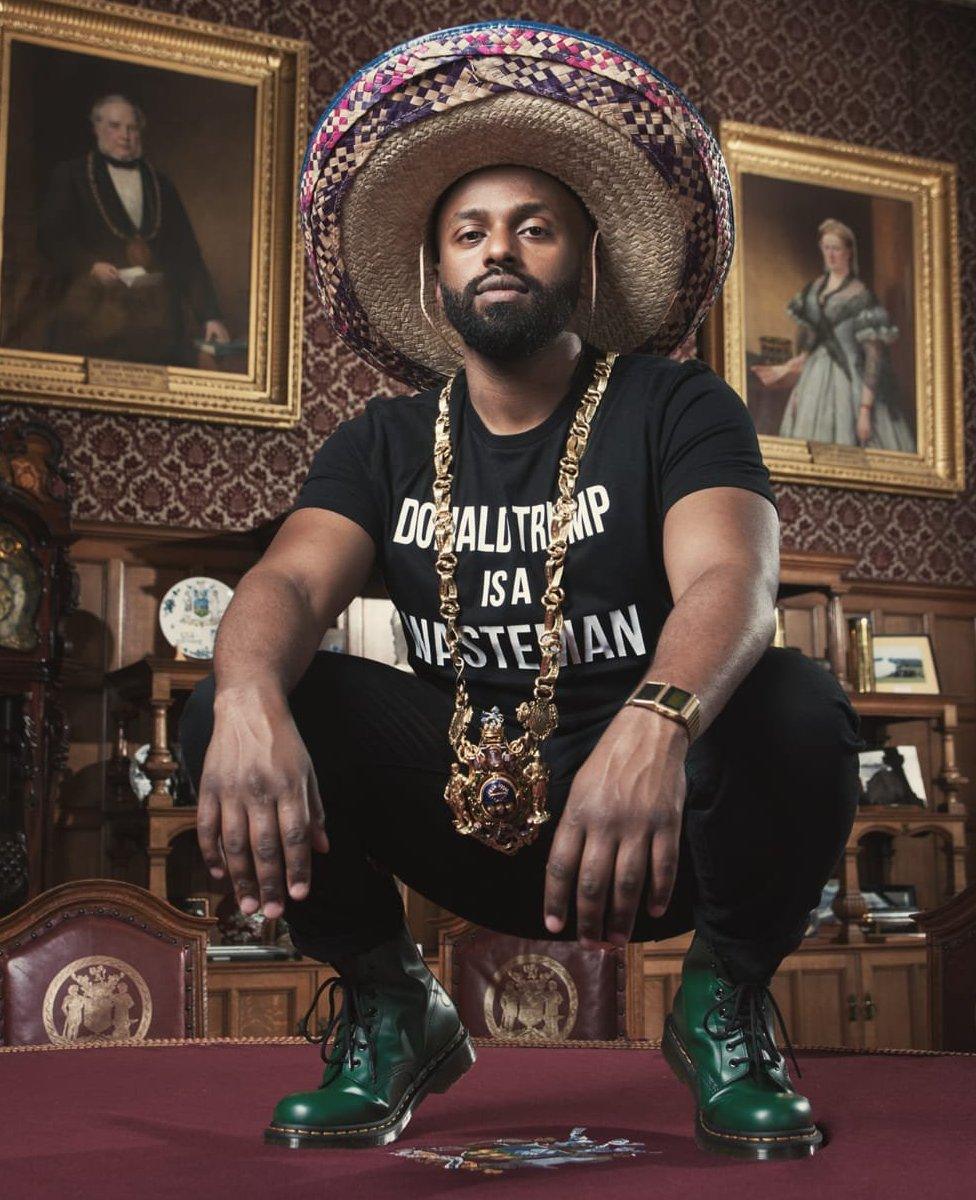
Magid Magid is probably best known for "banning" Donald Trump from entering Sheffield

Magid Magid made quite an impression as he arrived for his first day at the European Parliament in Strasbourg. Wearing a baseball cap and a T-shirt bearing an anti-fascist slogan, the newly elected MEP said he was asked to leave the building.
Who is Mr Magid and what barriers has the 30-year-old Somali refugee from Sheffield overcome to end up as a Green Party MEP?
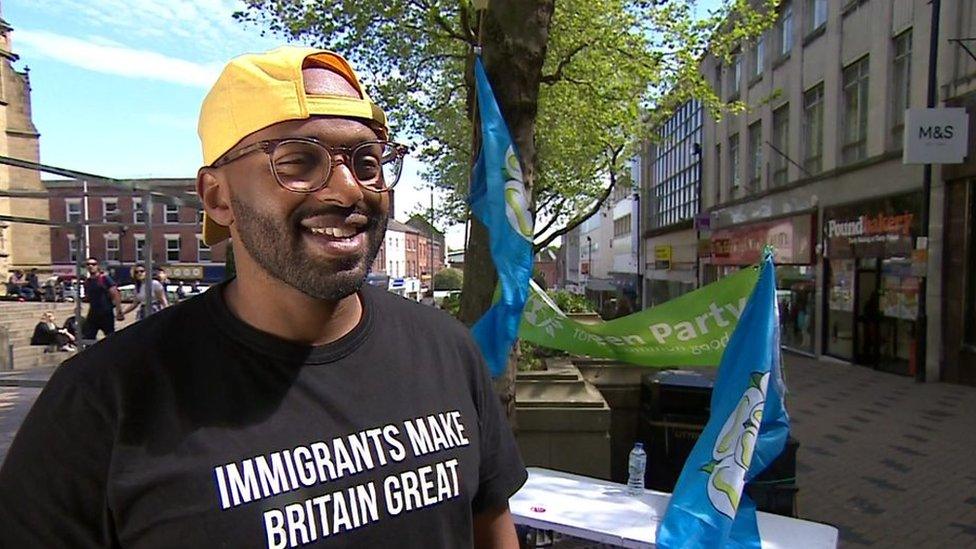
Mr Magid donned his trademark yellow baseball cap for his first day at the European Parliament
"I know I'm visibly different. I don't have the privilege to hide my identity. I'm BLACK & my name is Magid. I don't intend to try fit in. Get used to it!"
This was Mr Magid's response, external to being asked to leave the European Parliament building by someone he said he believed to be an official.
While the European Parliament said no member of staff was involved, Mr Magid - one of six MEPs for Yorkshire and the Humber - said the incident "says a lot about what people think the stereotypical politician is meant to look like".
And it's hard to argue he doesn't have a point - of the new European Parliament's 751 members, less than a dozen are black.
To the people of Sheffield, where Mr Magid recently finished a year as the city's Lord Mayor, his straight talking will have come as no surprise.
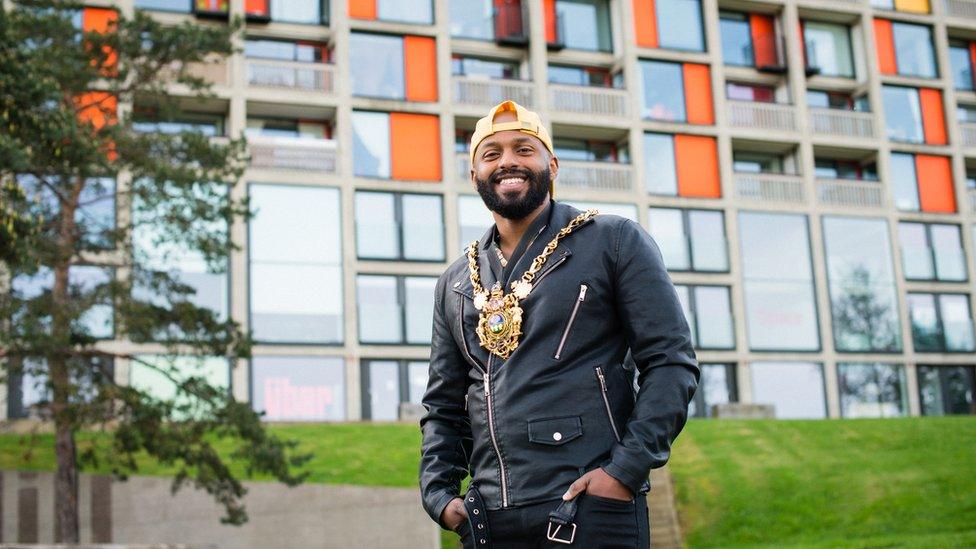
Mr Magid has become a source of inspiration for young people across the world
From his eye-catching style - Dr Martens and baseball caps coupled with the 18-carat gold chain of office - to his back story - the Somali refugee who came to the UK aged five - he was nothing like the stereotypical image of a Lord Mayor.
During his 12 months in office he hit the headlines time and again, most notably for "banning" US President Donald Trump from Sheffield.
Born in Burao, in northern Somalia, Mr Magid and his family left the war-torn country in 1994 in search of "a better life". After six months in a refugee camp in Ethiopia, the family - his mother and five older siblings - settled in Burngreave in Sheffield.
In 2018, Magid Magid told the BBC about how he went from an Ethiopian refugee camp to Sheffield Lord Mayor
He went to Sheffield's Fir Vale School, where he said he was "just like your average child", before studying aquatic zoology at the University of Hull.
Mr Magid ran a digital marketing business before being elected as a councillor in 2016, and was appointed Lord Mayor last year.

Magid moment: At home in Sheffield as a young boy
The role is a ceremonial one, but Mr Magid was determined he would be remembered as more than just a figurehead shaking hands at church fetes.
Asked if he set out to shake things up, he said his very existence in local government was "radical to a lot of people".
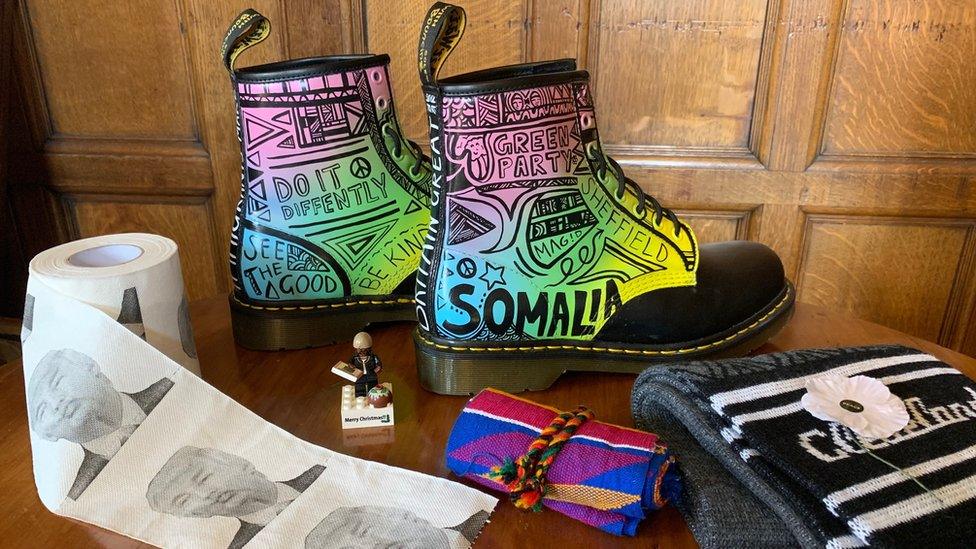
He kept a pair of personalised Dr Martens boots and Donald Trump loo roll on display in the Lord Mayor's parlour
But Mr Magid said he would sooner face the flak - things were thrown at his official car and he was sent racist hate mail and death threats - than stay silent.
"As long as I am making people feel something, connect or engage, even if that is calling me [names], at least I'm evoking some interest in the role and people are caring," he said.

Mr Magid received a number of threats during his time as Lord Mayor
His approach to the role polarised public opinion.
The Lord Mayor's stance on Mr Trump prompted some to say they were "embarrassed" to admit they were from Sheffield, while others accused him of abusing his position.
More acerbic comments were aired in a series of letters to the local newspaper, shortly after his appointment.
One reader said he represented "everything that is wrong with our once great city", while another said the role should be "reserved to a person of white, English descent".
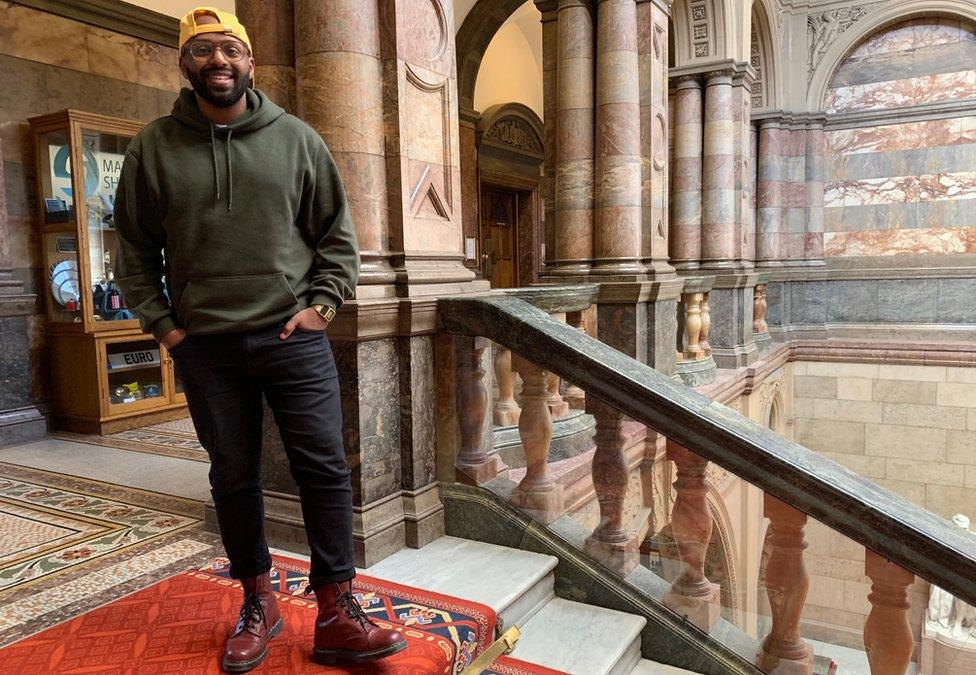
Mr Magid said he felt compelled to stand as an MEP at a "pivotal moment" he sees as a "battle for the soul of Britain"
Mr Magid readily acknowledges he is "not everyone's cup of tea".
"People really either love me or they hate me, but either way they've got a passionate opinion," he said.
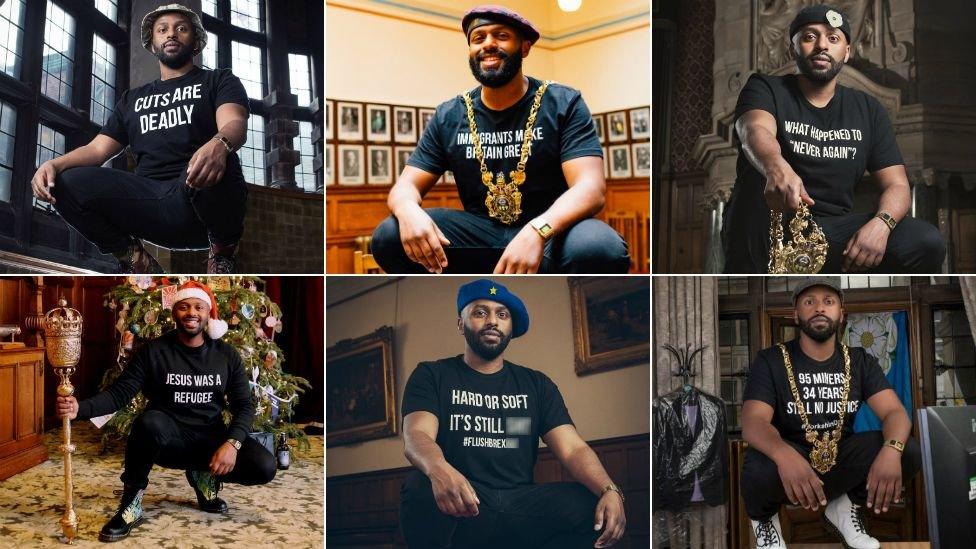
He is well known for wearing T-shirts bearing political slogans
Speaking in May, Mr Magid said he keeps a message on his phone from a Somali refugee living in Austria who said she had been inspired by him to stand in her local elections.
His story also reached pupils at Crocker Farm Elementary in Amherst, Massachusetts.
Classroom assistant Jean Fay said two youngsters, one from Sri Lanka and the other from Cape Verde, had spent time researching his rise.
"The students were excited that someone so young like them, someone who is an immigrant like them, who speaks a different language like them, can be someone who is elected by a large group of people and can make a difference in the world," she said.
"Seeing someone like Magid, who they can relate to, makes them believe this is possible."

Young students in the US carried out a research project on the politician
Closer to home, in Burngreave, the deprived part of Sheffield where Magid grew up, he has been hailed a "hero" by Safiya Saeed. She is the founder of community group Big Brother Burngreave, which, among other things, aims to divert teenagers from violent crime.
She said young people in her group, originally from places including Somalia, Yemen, Ethiopia and Congo, could relate to the fact Mr Magid had endured racism and prejudice.
"For many of them, for many of their parents, politics is not something they engage with, but Magid has made it fashionable," Ms Saeed said.
"He's shown you can wear your own gear and trainers - you don't have to be in a suit.
"That's real for them. It's shown them [politics] is no longer just a white person's position."
In the view of Kate Dommett, a senior lecturer in the public understanding of politics at the University of Sheffield, Mr Magid's actions "completely redefined" the role of Lord Mayor.
"There have always been very minimal expectations about what the mayor in Sheffield did, but he came in and just immediately challenged those expectations, behaving in a very, very different way," she said.
"It's quite unprecedented for essentially a local councillor who has only ceremonial powers to have that kind of national profile, and he's built that out of nothing."
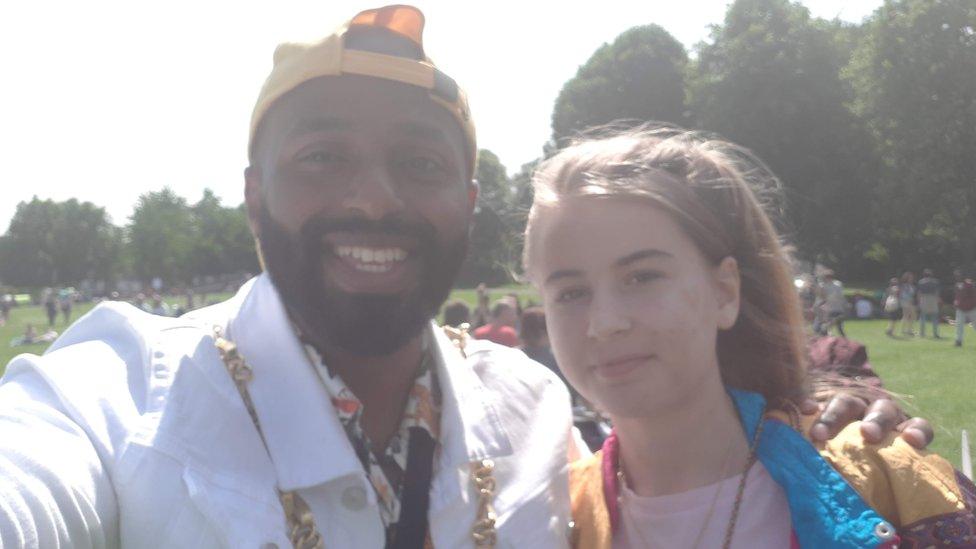
Joanna Hall says young people often struggle to have their voices heard
Sheffield youth councillors, external Joanna Hall, 15, and Jude Smith, 14, said previous Lord Mayors did not stand out and largely failed to listen to young people.
"We've had real difficulty getting through to people in power," said Joanna.
"There have been a lot of people that are just there for show."
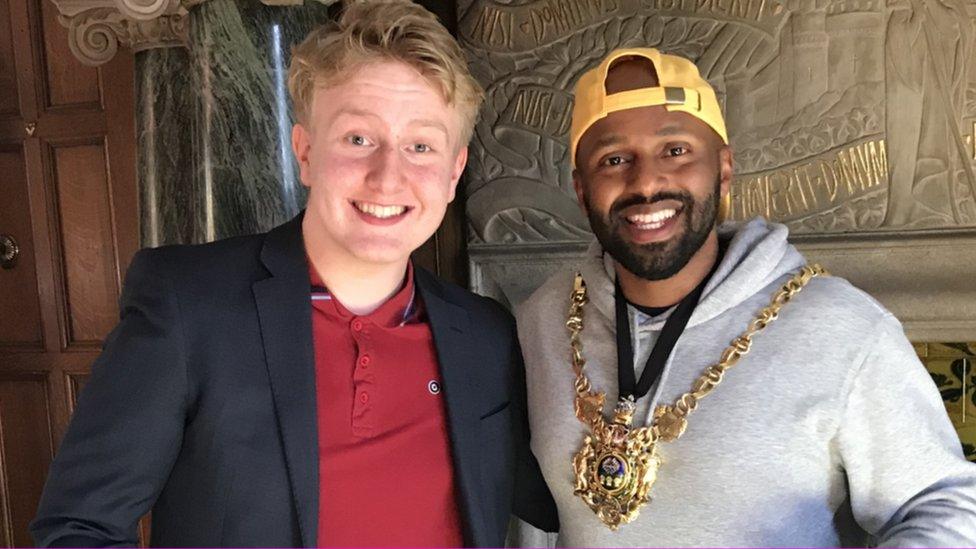
Jude Smith says Mr Magid is a "beacon of hope"
Jude, who says he chats with Mr Magid on Instagram, said: "I have mates who were disinterested in politics who have now jumped into it because of him.
"I think he's been a massive beacon of hope."
- Published2 July 2019
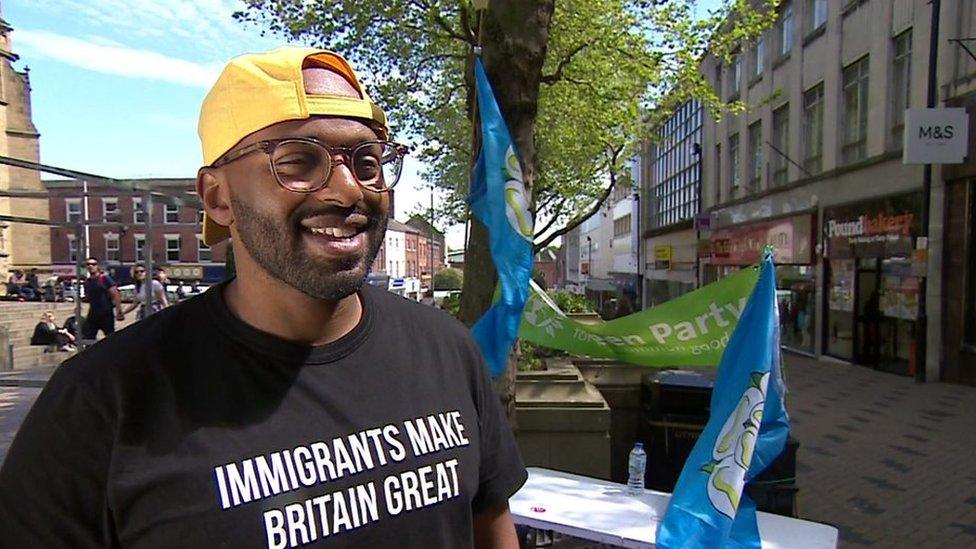
- Published27 May 2019
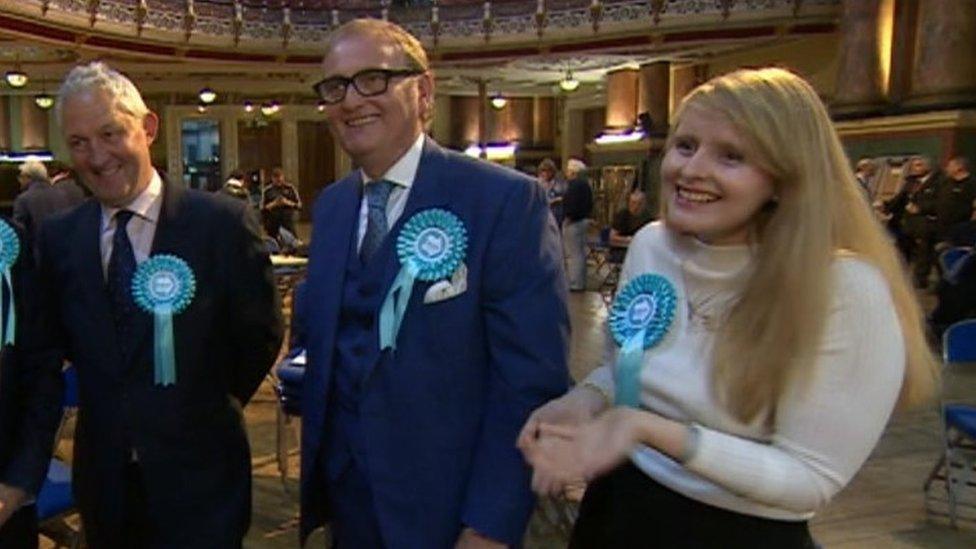
- Published14 February 2019
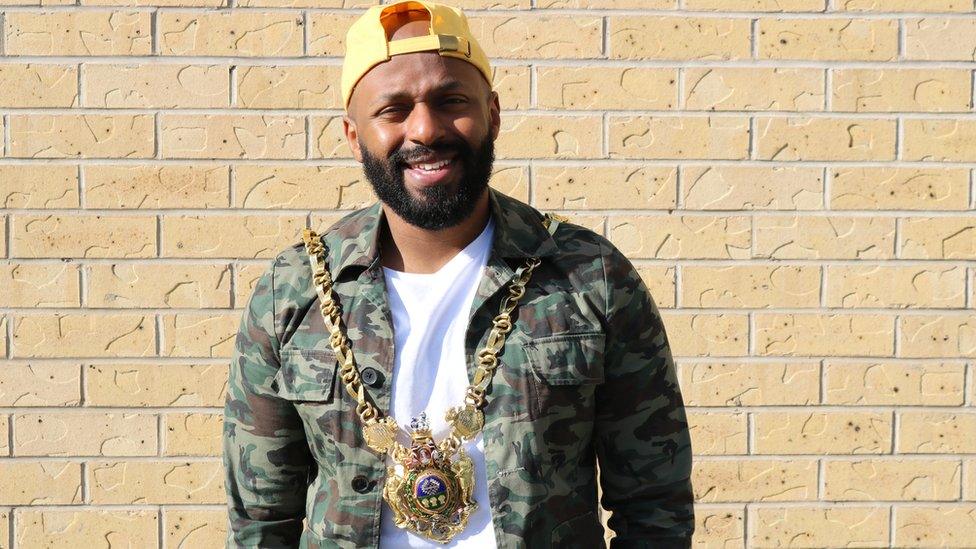
- Published19 November 2018

- Published2 October 2018

- Published4 July 2018

- Published7 June 2018
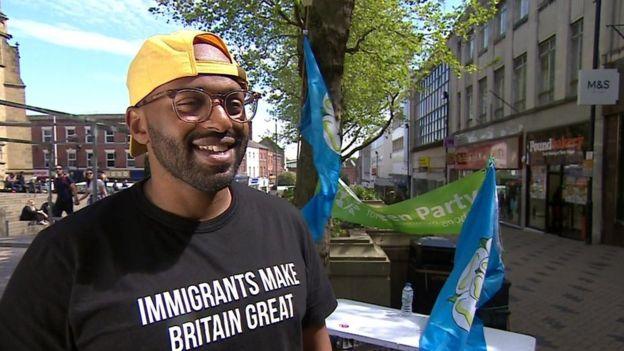
- Published18 May 2018
